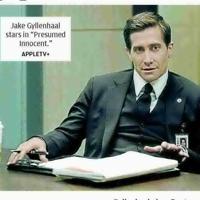In the annals of pointless remakes, “Presumed In-nocent” is at the top. Or is it the bottom? Whichever is worse. The eight-episode Apple TV+ series based on the Scott Turow legal thriller (first adapted into a 1990 movie starring Harrison Ford) has Jake Gyllenhaal playing Chicago prosecutor and family man Rusty Sabich, who is tasked with investigating the murder of a colleague. Unbeknownst to anyone at work, the two had been having an affair. Eventually, Rusty is kicked off the case and charged with the murder himself. Whether he did it — and how his legal case unfolds — is the crux of the story.
Show creator David E. Kelley (who has a long track record with legal dramas, not that you’d know it here) has made a number of changes, none of which deepen the narrative. Instead of being a father to one, Rusty now has kids, plural. Instead of hiring a onetime courtroom foe as his attorney, now his former boss, the recently ousted state’s attorney, is mounting Rusty’s defense. Instead of crime-scene photos of the victim fully clothed, the show takes us to the crime scene, where the victim is trussed up naked. Even her fertility status (a key piece of evidence in the original) is changed. None of these details improve the story or create a sense of “maybe I don’t know where this is going” for anyone familiar with Turow’s novel or the film.
People are also reading…
The 1990 movie came out amid a spate of erotic thrillers premised on a lurid femme fatale archetype, of women who are too sexy for their own good and the men whose lives they destroy, from “Basic Instinct” to “Fatal Attraction” (also recently adapted into an inconsequential TV series for Paramount+). There’s a cringeworthy moment in the film when the victim’s ex all but blames her for her own murder, recalling a look of disgust she once gave him: “At that moment, I remember I had the most desperate wish that she were dead. Maybe she made a man feel like that who actually acted on that fantasy.”
Then again, at least the movie had lines like this: “They’re so close, you can see (one guy’s) nose sticking out of (the other guy’s) belly button.” Even so, the movie is too long at two hours, and there’s nowhere near enough story to fill out a multi-episode TV series. Tangents about corruption in the criminal justice system seem to have evaporated, despite the expanded running time.
Gyllenhaal plays Rusty as unsympathetically as possible, which isn’t a bad choice — he’s a man who made bad choices, and now his back is against the wall — but Gyllenhaal’s talents are not suited to this suite of emotions and behaviors, which read mostly as “angry” and “desperate.” Rusty is off the rails, but there’s no ambiguity, and the victim is barely a character (true of the movie, as well) but rather an idea upon whom everyone can project their issues.
The script does nobody here any favors, including Ruth Negga as Rusty’s wife, Bill Camp as his boss and protector, and Peter Sarsgaard as an office rival who is all too eager to nail him.
Sarsgaard is usually a terrific actor, but even he can’t make any of this work. “Ladies and gentlemen of the jury,” he says, “my name is Tommasino Molto. But I’m from Chicago, like you, so it’s Tommy.” Considering the adaptation has no interest in its Chicago setting, this sudden introduction of a character’s supposed Chicago bona fides is weird. Sweaty, even. “Presumed Sweaty” might have been a more accurate title for the series overall.





